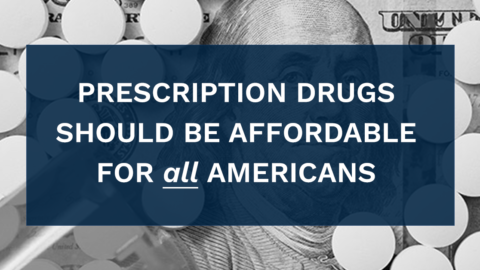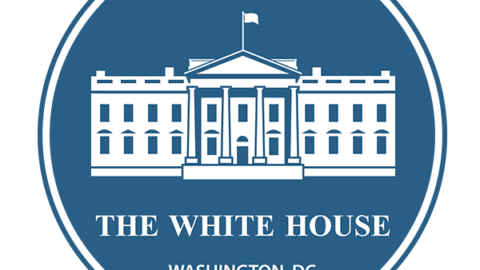Reducing Drug Prices
Over the past decade, the cost of prescription drugs has increased three times faster than the rate of inflation. Prescription drug costs are prohibitive for many consumers and are a leading cause of ever-increasing health care coverage costs. PBGH is focused on reducing the cost of prescription drugs by addressing the underlying drivers of drug costs. We work with policymakers and stakeholders to inject more competition, transparency and value into the health care system.

The Issue
One in four Americans has trouble paying for prescription drugs and four in five believe the cost of drugs is unreasonable. Everyone agrees the system is broken.
Drug manufacturers and middlemen, such as pharmacy benefit managers (PBMs), are gaming the system for profit at the expense of employers, taxpayers and the government. They’ve created a system so complex and convoluted that only they understand it. They use their power to shut out reformers and pad their bottom line. This must end — lives depend on it. That’s why EmployersRx is pressing the U.S. Congress to act now to unrig the system.
Our Mission
Employers’ Prescription for Affordable Drugs aims to mobilize large employers to drive down prescription drug costs by advocating for public policies based on increased competition, transparency and value.
Our Principles
Market Forces
Strengthening market forces is the best way to improve efficiency and quality, but the drug market has several unique characteristics that require public policy intervention to protect consumers.
Business Responsibility
Employers should adopt value-based purchasing strategies to contain drug costs and create programs that model best practices for other companies.
Government Insurance Responsibility
Government-run insurance programs, such as Medicare, must use their bargaining power to help rein in costs for the entire drug market.
System-Wide Costs
Policies to rein in drug costs should address drivers of high drug costs across the system rather than focusing on a single group, such as Medicare, and should not simply shift costs to employers and consumers.
Transparency
Transparency is essential to containing costs since much of the drug supply chain is opaque to consumers due to complex payment arrangements and gag clauses.
Innovation
Government should incentivize innovative drug development and prevent companies from exploiting the system for profit by blocking generics and biosimilars.
Patient Protection
Patients, especially those with serious conditions, should not be faced with excessively high bills to obtain the medications they need to survive.
Coalition Members
Employers’ Prescription for Affordable Drugs
Read More about Employers’ Prescription for Affordable DrugsSoaring drug expenses are a key factor in the overall rise of health care costs. This alliance is tackling the cost of prescription drugs by working with policymakers and stakeholders to inject greater competition, transparency and value into the health care system.
EmployersRx 2022 Policy Agenda
Read More about EmployersRx 2022 Policy AgendaEmployersRx supports policies to reduce prescription drug costs for all purchasers while encouraging meaningful innovation.
Featured

Changing the Game: Groundbreaking Drug Benefit Purchasing Standards for Large Employers
PBGH’s PBM Purchasing Standards build on a long history of combatting rising drug costs and helps employers and other health care purchasers combat abusive PBM contracting practices.

PBM Reform Act a Critical First Step in Ending PBM Abuses, Key Fiduciary Requirement Missing
The bipartisan Pharmacy Benefit Manager (PBM) Reform Act advanced out of a key congressional committee this week, paving the way for eventual floor debate of the landmark legislation.

Historic Drug Legislation Passed: What It Means for Employers and American Workers
In the wake of the recent drug pricing reforms passed, learn six steps employers and purchasers can take to address the exceedingly high-cost burden of prescription drugs.

PBGH Statement on the Parliamentarian’s Decision to Limit Drug Provisions in the Reconciliation Bill to Medicare Only
Review of the drug pricing provisions of the reconciliation package by the parliamentarian today resulted in good news for America’s seniors in that it allows Medicare to negotiate prescription drug prices and potentially lower costs for millions of Americans.

PBGH Joins More Than 90 Organizations to Call on the Senate to Pass Drug Pricing Reforms
PBGH joined more than 90 organizations representing patients, consumers, seniors, unions, small businesses, large employers, physicians and disease advocacy groups to urge the Senate to immediately advance a reconciliation package that includes the reforms to lower prescription drug prices agreed to in the Build Back Better Act.

Patients and Employers Agree: Congress Must Allow Medicare to Negotiate Lower Drug Prices for Americans
Patients and employers urge the House Ways and Means and Energy and Commerce Committees to move forward with H.R. 3, a bill that will empower Medicare to negotiate lower drug prices on behalf of Americans.

EmployersRx: Congress Must Reduce Drug Costs for Everyone
Congressional leaders are currently drafting legislation that would allow the federal government to negotiate the price of high-cost drugs and those newly entering the market.

PBGH Statement on President Biden’s Remarks on Lowering Drug Costs
Addressing health care costs, and in particular the cost of prescription drugs, is an economic issue. Earnings siphoned off by health care costs limit job creation and wage growth, divert investment and cripple competitiveness and innovation.
Resources

PBM Purchasing Standards for Plan Sponsors

Pharmacy Benefit Tactics Drive Up Drug Prices, Limit Access, Contribute to Health Risks

EmployersRx Letter on Reining in Drug Prices
EmployersRx calls on Congress to take specific actions to lower drug costs.

EmployersRx Response to FTC on the Business Practices of Pharmacy Benefit Managers

PBGH Letter on Pharmacy Cost Transparency Interim Final Rule
PBGH continues to advance pharmacy cost transparency on behalf of purchasers through standardized reporting requirements.

EmployersRx Letter to House Leaders on HR 3
EmployersRx sent a letter to House leaders expressing support for the Elijah E. Cummings Lower Drug Costs Now Act.

Employer Groups Send Letter on Drug Pricing to Senate Committee of Finance Chairman

Letter to Congressional Leadership re: Prescription Drug Pricing

America’s Employers and Health Care Purchasers Support Wyden Principles on Drug Price Reform

PBGH Letter to Congressional Leadership re: Aducanumab pricing

Case Studies

Policy

State-Level Policies

STATEMENT: PBGH Applauds Initiatives by House Leadership Aimed at Lowering Drug Prices
Announcements
PBGH Statement on the Parliamentarian’s Decision to Limit Drug Provisions in the Reconciliation Bill to Medicare Only
Review of the drug pricing provisions of the reconciliation package by the parliamentarian today resulted in good news for America’s seniors in that it allows Medicare to negotiate prescription drug prices and potentially lower costs for millions of Americans.
PBGH Joins More Than 90 Organizations to Call on the Senate to Pass Drug Pricing Reforms
PBGH joined more than 90 organizations representing patients, consumers, seniors, unions, small businesses, large employers, physicians and disease advocacy groups to urge the Senate to immediately advance a reconciliation package that includes the reforms to lower prescription drug prices agreed to in the Build Back Better Act.
Patients and Employers Agree: Congress Must Allow Medicare to Negotiate Lower Drug Prices for Americans
Patients and employers urge the House Ways and Means and Energy and Commerce Committees to move forward with H.R. 3, a bill that will empower Medicare to negotiate lower drug prices on behalf of Americans.
EmployersRx: Congress Must Reduce Drug Costs for Everyone
Congressional leaders are currently drafting legislation that would allow the federal government to negotiate the price of high-cost drugs and those newly entering the market.
PBGH Statement on President Biden’s Remarks on Lowering Drug Costs
Addressing health care costs, and in particular the cost of prescription drugs, is an economic issue. Earnings siphoned off by health care costs limit job creation and wage growth, divert investment and cripple competitiveness and innovation.
EmployersRx calls on Congress and industry to ensure fair and reasonable pricing for COVID-19 vaccines and therapeutic drugs.
As the COVID-19 crisis will only end when people have access to effective vaccines and therapeutic drugs, EmployersRx urges legislators, manufacturers and providers to ensure fair and reasonable pricing of these shortly anticipated treatments.
Employers Support Bipartisan Bill to Increase Drug Price Transparency and Reduce Gaming by Middlemen
Employers’ Prescription for Affordable Drugs (EmployersRx) has announced its support of H.R. 5304, the “PBM Transparency and Prescription Drug Costs Act.” This bipartisan legislation will markedly lower private health insurance premiums and increase competition in the marketplace, according to a July 2019 report from the Congressional Budget Office.
Statement of Record for House Committee on Ways and Means, Subcommittee on Health
Chairman Doggett, Ranking Member Nunes, and members of the House Ways and Means Health Subcommittee, thank you for the opportunity to provide a written statement for today’s hearing on behalf of the Employers’ Prescription for Affordable Drugs (EmployersRx), a coalition of employers united in advocacy to drive down the cost of prescription drugs—one of the biggest challenges in health care.
No More ‘Sucker at the Table’: New Coalition to Represent Fortune 500 Firms Paying Prescription Drug Bills
Tired of being “the sucker at the table,” a group representing Fortune 500 companies has formed a lobby to push congressional drug-pricing policies that focus beyond Medicare. Employers’ Prescription for Affordable Drugs has described its goal as “to mobilize large employers to drive down prescription drug costs by advocating for public policies based on increased competition, transparency and value.”
Employers Shoulder Plenty of Drug Costs, but Haven’t Lobbied Much to Lower Them — Until Now
Legislation aiming to reduce drug prices has thus far focused on changes to federal programs such as Medicare. But Walmart, Pepsi, and other large companies provide employer-sponsored health insurance to more than 150 million Americans, making them the largest footers of health bills.


